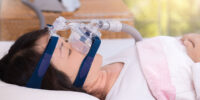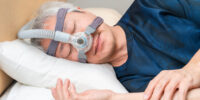How To Create A Sleep Apnea Management Plan?

Sleep apnea is a common sleep disorder characterized by pauses in breathing during sleep. It can lead to a range of health problems, including daytime fatigue, high blood pressure, and an increased risk of heart disease.
To effectively manage sleep apnea, it is important to develop a comprehensive management plan. This article provides guidance on creating a sleep apnea management plan, which involves:
- Understanding the symptoms and causes of sleep apnea
- Seeking professional diagnosis and treatment
- Making lifestyle changes to improve sleep quality
- Maintaining a healthy weight and exercising regularly
- Practicing good sleep hygiene
- Using medical interventions as recommended
- Monitoring sleep apnea symptoms and progress
- Staying informed and engaging in supportive communities.
By following these steps, individuals with sleep apnea can effectively manage their condition and improve their overall quality of life.
Key Takeaways
- Professional diagnosis and treatment, including a thorough evaluation and sleep study, are essential for managing sleep apnea.
- Lifestyle changes such as maintaining a consistent sleep schedule, avoiding alcohol and sedatives, and regular exercise can improve sleep quality and reduce the severity of sleep apnea symptoms.
- Medical interventions such as continuous positive airway pressure (CPAP) therapy and oral appliances can be used to manage sleep apnea.
- Staying informed and engaging in supportive communities can provide knowledge, resources, and emotional support for managing sleep apnea.
Understand the Symptoms and Causes of Sleep Apnea
Sleep apnea is characterized by a range of symptoms, including excessive daytime sleepiness, loud snoring, and episodes of interrupted breathing during sleep, which can be caused by factors such as obesity, anatomical abnormalities, or neurological conditions.
It is important to understand these symptoms and causes in order to develop an effective sleep apnea management plan.
Excessive daytime sleepiness is a common symptom experienced by individuals with sleep apnea, often leading to difficulties in concentration and increased risk of accidents.
Loud snoring is another prominent symptom, caused by the partial obstruction of the airway during sleep.
Episodes of interrupted breathing, known as apneas, can occur numerous times throughout the night, leading to disrupted sleep patterns.
Obesity, anatomical abnormalities such as enlarged tonsils or a deviated septum, and neurological conditions such as stroke or Parkinson’s disease, are known to contribute to the development of sleep apnea.
Understanding these symptoms and causes is crucial for healthcare professionals to accurately diagnose and develop an appropriate sleep apnea management plan.
Seek Professional Diagnosis and Treatment
Seeking professional diagnosis and treatment is essential for effectively managing sleep apnea. If you suspect that you have sleep apnea, it is important to consult a healthcare professional who specializes in sleep disorders. They will conduct a thorough evaluation, which may include a detailed medical history, physical examination, and sleep study.
The sleep study, also known as polysomnography, is the gold standard for diagnosing sleep apnea. It involves monitoring various parameters such as brain activity, eye movements, heart rate, and oxygen levels during sleep. Once a diagnosis is confirmed, treatment options can be discussed.
The most common treatment for sleep apnea is continuous positive airway pressure (CPAP) therapy, which involves wearing a mask that delivers a constant flow of air to keep the airways open during sleep. Other treatment options may include oral appliances, lifestyle changes, and surgery, depending on the severity and underlying causes of sleep apnea.
It is important to work closely with a healthcare professional to develop a personalized management plan that best suits your needs.
Make Lifestyle Changes to Improve Sleep Quality
Implementing certain lifestyle changes can significantly enhance the quality of sleep for individuals with sleep apnea.
One important change is maintaining a consistent sleep schedule by going to bed and waking up at the same time each day. This helps regulate the body’s internal clock and promotes better sleep.
Additionally, avoiding alcohol and sedatives, especially before bedtime, can improve sleep quality as these substances can relax the muscles in the throat and worsen sleep apnea symptoms.
Engaging in regular exercise can also be beneficial, as it can help with weight management and strengthen the muscles involved in breathing.
Lastly, creating a comfortable sleep environment by using a supportive pillow, maintaining a cool temperature, and reducing noise and light disturbances can further enhance the quality of sleep for individuals with sleep apnea.
Maintain a Healthy Weight and Exercise Regularly
Maintaining a healthy weight through regular exercise has been shown to have a positive impact on sleep quality in individuals with sleep apnea. Exercise not only helps in weight management but also improves cardiovascular health, which is crucial for individuals with sleep apnea.
Here are some ways in which maintaining a healthy weight and exercising regularly can benefit sleep apnea management:
- Reduces the severity of sleep apnea symptoms
- Decreases the frequency of apnea episodes during sleep
- Improves overall sleep quality
- Enhances daytime alertness and reduces fatigue
- Lowers the risk of developing other health conditions associated with sleep apnea, such as high blood pressure and diabetes.
Engaging in physical activities like walking, jogging, swimming, or cycling can contribute to weight loss and improve sleep apnea symptoms. It is recommended to consult a healthcare professional before starting any exercise program to ensure safety and effectiveness.
Practice Good Sleep Hygiene
Practicing good sleep hygiene is essential for optimizing sleep quality and managing sleep apnea effectively. Sleep hygiene refers to a set of behaviors and habits that promote healthy sleep patterns.
To begin with, it is important to maintain a consistent sleep schedule by going to bed and waking up at the same time every day, even on weekends. Additionally, creating a relaxing bedtime routine can signal the body that it is time to sleep. This can include activities such as reading a book, taking a warm bath, or practicing relaxation techniques.
It is also crucial to create a sleep-friendly environment by keeping the bedroom dark, quiet, and cool. Avoiding stimulants like caffeine and nicotine close to bedtime and limiting screen time before bed can also improve sleep quality.
By incorporating these practices into one’s daily routine, individuals with sleep apnea can improve their sleep quality and overall well-being.
Use Medical Interventions as Recommended
Medical interventions such as continuous positive airway pressure (CPAP) therapy and oral appliances are commonly recommended by healthcare professionals to effectively manage sleep apnea and improve sleep quality.
CPAP therapy involves wearing a mask that delivers pressurized air to keep the airway open during sleep, preventing pauses in breathing. It is considered the gold standard treatment for sleep apnea and has been shown to significantly reduce symptoms and improve overall health outcomes.
Oral appliances, on the other hand, are custom-made devices that help reposition the jaw and tongue to maintain an open airway. They are often recommended for mild to moderate cases of sleep apnea or for individuals who cannot tolerate CPAP therapy.
Medical interventions should be used as recommended by healthcare professionals and in conjunction with other lifestyle modifications for optimal sleep apnea management.
Monitor Your Sleep Apnea Symptoms and Progress
Medical interventions are crucial in managing sleep apnea, but it is equally important to monitor the symptoms and progress of the condition. Regular monitoring allows individuals and healthcare professionals to assess the effectiveness of the treatment plan and make necessary adjustments.
Monitoring can involve keeping a sleep diary to track sleep patterns, noting any changes in symptoms, and using sleep apnea devices such as a continuous positive airway pressure (CPAP) machine to measure sleep quality and adherence to treatment.
Additionally, objective measures like overnight sleep studies and daytime nap tests can provide valuable information about the severity of sleep apnea and its impact on daily functioning.
By closely monitoring sleep apnea symptoms and progress, individuals can work with their healthcare team to optimize their management plan and improve their overall quality of life.
Stay Informed and Engage in Supportive Communities
Staying informed and actively participating in supportive communities can provide individuals with a wealth of knowledge and resources to better understand and manage their sleep apnea condition. By staying up-to-date with the latest research and developments in sleep apnea management, individuals can gain insight into new treatment options and strategies.
Engaging in supportive communities, both online and offline, allows individuals to connect with others who are facing similar challenges and share experiences, tips, and advice. These communities can provide a sense of belonging and support, reducing feelings of isolation and providing emotional encouragement.
Moreover, participating in supportive communities can also lead to the discovery of additional resources and tools, such as educational materials, support groups, and expert advice. By actively engaging in these communities, individuals can enhance their overall understanding of sleep apnea and develop effective strategies for managing their condition.
Frequently Asked Questions
How can I differentiate between normal snoring and sleep apnea?
Differentiating between normal snoring and sleep apnea can be done by considering certain factors such as frequency, loudness, interruptions in breathing, daytime symptoms, and the impact on sleep quality. A medical professional should be consulted for a definitive diagnosis.
Are there any medications available to treat sleep apnea?
No, there are no medications available to treat sleep apnea. The main treatment options include continuous positive airway pressure (CPAP) therapy, oral appliances, weight loss, and surgery, depending on the severity of the condition.
How can I prevent sleep apnea from worsening over time?
There are several ways to prevent sleep apnea from worsening over time, such as maintaining a healthy weight, avoiding alcohol and sedatives, sleeping on your side, quitting smoking, and using continuous positive airway pressure (CPAP) therapy.
Is it possible for sleep apnea to go away on its own without treatment?
Sleep apnea does not typically go away on its own without treatment. It is a chronic condition that requires medical intervention. Treatment options include continuous positive airway pressure (CPAP), lifestyle changes, and surgery, depending on the severity of the condition.
Can children also develop sleep apnea?
Yes, children can develop sleep apnea. It is a sleep disorder characterized by pauses in breathing or shallow breathing during sleep. It can be caused by enlarged tonsils, obesity, or underlying medical conditions.











